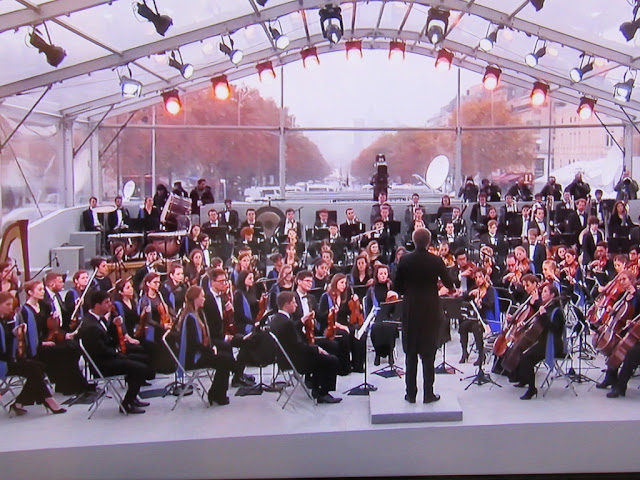The scene was Paris on a windy and rainy day where 70 world leaders came to commemorate the 100th Anniversary of the Armistice that ended World War I on November 11, 1918.
President Emmanuel Macron would make a stirring speech to learn the lessons of the war in order to resolve conflicts, avert wars, and spread prosperity, especially in this new era of rising nationalism. Meanwhile, organisers took pains to make the ceremony deliberately international and cross-cultural.

The streets were eerily clear of people for reasons of security as the leaders gathered in a covered space under the Arc of Triumph. Mayor Anne Hildalgo of Paris provided large TV screens in neighborhoods throughout the city so that people could see the ceremony.

Some 10,000 police were on duty to ensure maximum security in a city repeatedly targeted by jihadists since 2015. There were no reported incidents.
The day began with President Emmanuel Macron and his wife, Bridgette, welcoming their guests at the Élysée Palace.


Macron escorted the leaders from the Palace to buses that transported them to the Arc of Triumph for Armistice ceremonies. Chancellor Angela Merkel of Germany walked with Macron in a symbolic gesture of peace.

 Donald Trump did not join the other leaders at the Palace. Instead, his limousine took him directly to the Arc of Triumph because of a security threat posed by Femen, a radical feminist activist group that fights for women's rights. The group organizes topless protests against sex tourism, religious institutions, homophobia, and sexism. It was founded in Ukraine, but is now based in Paris. The day before Trump failed to visit the American cemetery of war dead because of rain. He also snubbed the Paris Peace Forum that was to take place after the memorial service.
Donald Trump did not join the other leaders at the Palace. Instead, his limousine took him directly to the Arc of Triumph because of a security threat posed by Femen, a radical feminist activist group that fights for women's rights. The group organizes topless protests against sex tourism, religious institutions, homophobia, and sexism. It was founded in Ukraine, but is now based in Paris. The day before Trump failed to visit the American cemetery of war dead because of rain. He also snubbed the Paris Peace Forum that was to take place after the memorial service. The Paris Peace Forum was conceived by Macron to highlight the importance of international institutions in helping resolve conflicts, avert wars and spread prosperity.
The ceremonies were dignified, solemn, and moving. They included military reviews, pomp, and the recognition of soldiers' service in the past and present.

Of course, the day remained focused on the fallen and the veterans who served their country.

There were musical performances by famous personalities and students alike.
Yo-Yo Ma performed a cello solo. The U.S-Chinese artist, who received the U.S. Presidential Medal of Freedom in 2010, was born in Paris in 1955.
Angelique Kidjo of Benin sang "Blewu" in tribute to the colonial troops who fought for France during the war. She is noted for her diverse musical influences and creative music videos. National Public Radio called her "Africa's greatest living diva", and New African magazine and Jeune Afrique listed her among the "2014 Most Influential Africans." Forbes Afrique put Kidjo on the cover of their "100 most influential women" issue in 2015. She now lives in New York.
The European Union Youth Orchestra, an ensemble of young musicians from all over the continent, performed Ravel’s Bolero led by Chief Conductor Vasily Petrenko of Russia.

A group of young people circled the Eternal Flame in a climatic end to ceremonies.
Macron gave a special greeting and thanks to the young people for their part on this solemn day.
At precisely 11 a.m., church bells rang throughout Paris--and France. Here is a split screen view of some Parisian churches.
“Patriotism is the exact opposite of nationalism. Nationalism is a betrayal of patriotism. In saying 'Our interests first, whatever happens to the others,' you erase the most precious thing a nation can have, that which makes it live, that which causes it to be great and that which is most important: its moral values."
Macron laid a wreath of flowers at the Tomb of the Unknown Soldier.

He "re-lit" the Eternal Flame with the support of youth.
A lone bugle called an end to the memorial service.




























































